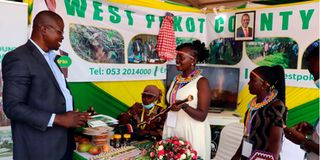Leadership key ingredient in Kenya's quest to industrialise

An exhibitor displays items for sale at West Pokot County stand during the 7th Annual Devolution Conference in Makueni County on November 25, 2021.
What you need to know:
- In the late 80s and early 90s, the young turks and other leaders then had a vision of a more democratic Kenya.
- In the 2000s, Vision 2030 provided the organising principle for political and economic policy.
Leadership is a critical ingredient of transformation in all spheres of human endeavour. This is true with regard to private firms, the public sector, religious organisations, non-governmental and even non-state actors.
The political culture of our country is based on criticism. Speeches by most political leaders comprise highlighting what is wrong and sometimes who is to blame. The speeches generally include a passionate plea to a more senior leader for help in solving the problems. Now whereas criticism has a key role to play in a functioning democracy, leadership is much more than that.
A good leader provides a compelling vision. Where are we going and why? A great leader mobilises, inspires and motivates. A leader must have clarity of vision, force of conviction and courage. But leadership is also contextual. It must fit the times, circumstance and role.
For example, in the fight for independence, the leaders then had a vision of independent Kenya. Land and freedom was Mau Mau’s clarion call. Indeed, the disagreements of the nationalist independence coalition arose on the question of land.
In the late 80s and early 90s, the young turks and other leaders then had a vision of a more democratic Kenya. And that vision led to the promulgation of the Constitution of Kenya 2010, with a very modern bill of rights, including second-generation social and economic rights.
Industrialising country
In the 2000s, Vision 2030 – on becoming a middle-income, democratic, industrialising country with a high quality of life – provided the organising principle for political and economic policy since it was unveiled under the Grand Coalition government in 2008.
Leadership roles evolve. Before devolution, the role of the councillor was limited. She made by-laws under the Local Governments Act. Now ward reps are at the heart of not only resource mobilisation but also provide oversight on the application of those resources. The evolving roles imply change in the required skill set.
Today, it is no longer tenable for reps to simply highlight the problems facing their wards. And it is not that leaders must be experts in all areas. It is obviously not possible for one to be an economist, engineer and agricultural expert at the same time. Rather, county assemblies must make use of available professional expertise.
In Laikipia, as in the rest of the country, the most urgent interest is to industrialise. It is to build a manufacturing base because without it, we will remain a lower middle-income society. Simply put, we want our farmers to use machines and modern tools. Who is making those machines and tools? We want our farmers to irrigate. Who is making irrigation equipment? We want high quality non-farm jobs. Where will they come from?
In practically all fields, if you want to be an engineer, doctor, nurse, teacher and so on, you spend many years learning within formal settings. But, there is a dearth of formal leadership training and development, particularly the role of the leader in driving industrialisation.
We must take urgent steps to develop our skills and lead our wonderful country towards industrialisation.
@NdirituMuriithi is the Governor of Laikipia County





